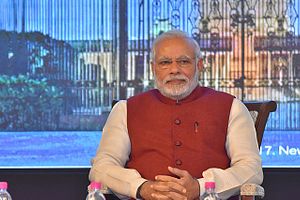Prime Minister Narendra Modi will be in London this week to attend the 2018 Commonwealth Heads of Government (CHOGM) summit. This will be his second visit to London since 2015. Looking back, it almost seems that 2015 was a radically different era with David Cameron as the British prime minister and Brexit still talked of as an impossibility. But for India-UK relations, Modi’s visit was an important one as India had failed to reciprocate three earlier visits by Cameron to India and there was a growing sense in London that the bilateral relationship was heading nowhere. Modi’s visit had reaffirmed New Delhi’s commitment to a strong India-UK partnership.
With bilateral trade of $13 billion and India being the third largest investor and the second largest international job creator in the UK, there is no reason to be diffident about this bilateral engagement. The UK is India’s fourth largest inward investor and the Indian diaspora in the UK of around 1.5 million is not only one of the largest ethnic minority communities but also one of the most productive, contributing around 6 percent to the country’s GDP.
During his meeting with the British Prime Minister Theresa May this week, the focus areas will be those where synergies could be built upon between British and Indian core strengths such as education, skill development, healthcare, cyber security, maritime security and innovation. The UK will be formally joining the International Solar Alliance. Theresa May’s visit to India in 2016, her first foreign visit outside Europe after taking over as prime minister, had been an underwhelming affair with then commerce minister Nirmala Sitharaman suggesting that difficulties faced by Indian professionals and students “sounds like non-tariff barriers in the services sector,” and underlining that “we are not being treated as old friends any longer.” The two nations will be hoping to put that sentiment behind. In his outreach to the diaspora, Modi will be addressing a major globally televised event during his visit, “Bharat Ki Baat, Sabke Saath.”
But beyond India-UK ties, all eyes will be on how Prime Minister Modi will try to revive what is widely regarded in India as a moribund organization: the Commonwealth. The Indian Prime Minister will be at CHOGM for the first time since 2010, as Modi had skipped the 2015 summit in Malta and his predecessor Manmohan Singh decided to ignore the 2011 and 2013 summits in Australia and Sri Lanka respectively. Now the British government is keen to revive the Commonwealth with Modi being invited personally by the Queen in a letter addressed to him which was delivered by Prince Charles, who visited India in November last year.
There is a renewed interest in the idea of India taking a leadership role in the Commonwealth to infuse a new lease of life into an organization which for many in Delhi has long outlived its usefulness. Though Jawaharlal Nehru decided to join the Commonwealth as he viewed it as a platform where India could develop connections with other erstwhile colonies as well as partly to balance Pakistan, his successors did not seem to be particularly interested in the grouping and viewed it largely as a colonial relic.
Today as Britain searches for a new global identity post Brexit, there are those who believe that the Commonwealth, where a third of the world’s population in English-speaking democracies resides spanning multiple ethnic and religious faultlines, could emerge as a significant international platform. And India, one of the most powerful and important of emerging global powers, should take the lead in reimagining the future of the Commonwealth.
For its part, New Delhi would be interested in how this platform can be used to generate momentum of trade-related issues. It is likely too that the CHOGM will focus on ways to enhance trade linkages among Commonwealth countries. Intra-Commonwealth trade hovers at around $800 billion and the target is to take it to the $1 trillion mark. India has already indicated that it is keen to let Commonwealth nations have free access to its world-class cricketing facilities.
While the 53-member grouping will also decide on appointing a successor to the 91-year-old British monarch at the London summit, there are signs that Britain is keen to pass on the baton of leadership, at least part of it, to India. As a nation that is seeking a to play the role of a “leading power” in the international system, New Delhi should not shirk this responsibility as the Commonwealth will be one platform where Chinese presence will not hinder Indian ambitions. Indian leadership will not go uncontested, of course, but taking leadership at this platform will help India project a sense of seriousness about is growing global profile.
For Britain, a rejuvenated Commonwealth will give it the confidence of being able to play a significant global role after Brexit. Meanwhile, for India, it can become a platform to demonstrate its leadership credentials. From trade and security, from connectivity to global governance, there are enough opportunities to tap into. India will be the center of attention at CHOGM 2018 and New Delhi would do well to take full advantage of the changing global realities and shifting British priorities. As Prime Minister Modi heads to London, he would do well remember that global leadership means creating new opportunities even where none exist at the first sight.
The younger generation in India have no connect to the idea of the Commonwealth. Modi has an opportunity to reinvent the very idea of the Commonwealth in India’s image.

































